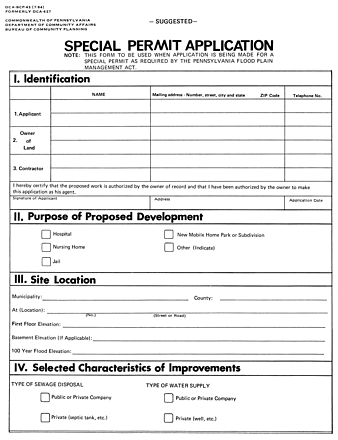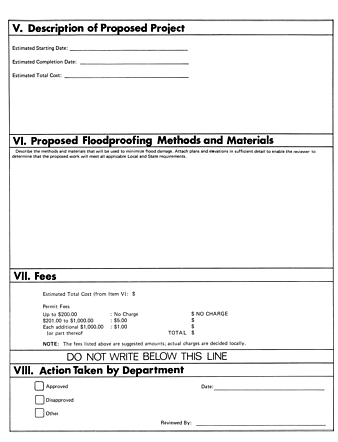§ 113.11. Reimbursements and grants to municipalities.
(a) Section 404 of the act (32 P. S. § 679.404) authorizes the Department to administer reimbursements and grants to municipalities to assist or reimburse them for costs incurred in complying with the requirements of the act. Grants and reimbursements shall be available from the Department in accordance with this section, provided that money is appropriated by the General Assembly for such purposes.
(b) Grants will be available from the Department to municipalities to reimburse them for allowable costs incurred in complying with the requirements of the act. Reimbursements will be for the following activities:
(1) Fifty per cent of the allowable costs set forth in subsection (d) incurred for the preparation and enactment, including required revisions, of the floodplain management regulations necessary to comply with the requirements of the act and this chapter.
(2) Fifty percent of the allowable costs set forth in subsection (d) for the administration, enforcement and implementation activities undertaken as required by the act.
(c) Grants will also be available from the Department to municipalities to reimburse them for allowable costs incurred in complying with either section 1910.3(c) or (d) (now section 60.3(c) or (d)) of the program regulations prior to October 4, 1978, the effective date of the act. The reimbursements will be for the following activities:
(1) Fifty percent of allowable costs set forth in subsection (d) incurred for the preparation and enactment, including required revisions, of the floodplain management regulations necessary to comply with the requirements of the program.
(2) Fifty percent of the allowable costs set forth in subsection (d) incurred for the administration, enforcement and implementation activities undertaken as necessitated by the requirements of the program.
(d) Allowable costs shall be those expenses incurred by a municipality in order to comply with the requirements of the act and this chapter. Allowable costs do not include those costs which are offset by permit fees imposed by the municipality. Costs incurred for the following items and activities shall be considered allowable costs for the purposes of this chapter.
(1) Preparation and enactment of floodplain management regulations, including the following:
(i) Costs of technical and legal services necessary to prepare regulations, administrative forms, maps and the like required by the act.
(ii) Costs of technical and legal services necessary for required public hearings.
(iii) Costs of technical and legal services necessary for enactment of the required regulations.
(2) Administrative, enforcement and implementation activities, including the following:
(i) Costs of review and processing of applications for required permits, including clerical activities.
(ii) Fees of special consultants necessary for technical consultation or plan review and permit processing matters.
(iii) Costs of monitoring and inspection activities, including fees for special consultants for technical consultation on specific matters.
(iv) Costs of technical and legal services incurred in enforcing the regulations including the restraining of violations, prosecutions and defending against appeals.
(v) Mileage expenses incurred by the permit officer in undertaking any of the administrative activities set forth in subparagraphs (i)—(iv).
(e) The Department will not reimburse municipalities for legal fees resulting from an appeal or suit against the Commonwealth; for the purchase of clothing or clothing allowance, for the printing or reproduction of regulations, forms or maps; or for another activity or expense not directly related to the requirements of the act or this chapter.
(f) Requests for a reimbursement shall be submitted to the appropriate regional office of the Department and shall be made in accordance with the following:
(1) Requests shall be submitted annually, within 3 months after the end of the fiscal year for which reimbursement is being requested, using an application form provided by the Department.
(2) An itemized statement shall accompany the application which statement provides the following information:
(i) The total expenses incurred and paid by the municipality in performing the duties necessitated by the requirements of the act.
(ii) The total amount of fees and other money earned—including uncollected fees—by the municipality in performing its duties.
(iii) The difference between expenses incurred and income, and the amount of reimbursement being requested.
(iv) Certification as to the accuracy of the information being submitted by the chief executive officer of the municipality and the individual who prepared the statement.
(g) If, in a fiscal year, appropriations are insufficient to cover the reimbursements and grants to municipalities for compliance with the requirements of the act and this chapter, the Department will report this fact to the General Assembly and will request the appropriation of additional funds. If a deficiency appropriation is not enacted, a municipality which has not received its reimbursement because of lack of funds will be given first priority when funds become available.
(h) Grants may also be made by the Department to municipalities for certain other activities such as surveys, studies, investigations, research and analyses related to the specific purposes and requirements of the act. The grants will be made at the sole discretion of the Department and will not be awarded unless there is a thoroughly documented need or value to the undertaking. Requests for a grant shall be submitted to the Governor’s Center for Local Government Services; Department of Community and Economic Development; Commonwealth Keystone Building, 400 North Street, 4th Floor, Harrisburg, Pennsylvania 17120 for consideration. The request shall be in the form of a written proposal consisting of a narrative which clearly and thoroughly describes the work proposed to be undertaken and the itemized cost estimate, including a complete list of the people to be involved and their specific responsibilities regarding the work to be undertaken. In addition, the Department may require other reasonable information it deems necessary in order to satisfactorily evaluate any proposal or to satisfactorily monitor any work being undertaken, or both.
(i) Grants from the Commonwealth will be in addition to grants for similar purposes made to a municipality by the Federal government; provided that the grants be limited so that the total of State and Federal grants does not exceed 50% of the allowable costs incurred by the municipality.
(j) Application forms and related information concerning reimbursements may be obtained from any Department regional office.
(k) Municipalities shall keep accurate records and accounts of allowable costs incurred for a period of 3 years following the submission of an application to the Department for reimbursement. During this time the Department will, upon request, have access to the records and accounts for monitoring and auditing purposes.

APPENDIX II

APPENDIX II (Continued)
APPENDIX III
RECOMMENDATIONS AND SUGGESTIONS TO MUNICIPALITIES
While not required by the act, the National Flood Insurance Program, or these regulations, the following recommendations and suggestions are offered to municipalities for their consideration as they undertake their various floodplain management activities:
(a) Municipalities are encouraged to contact any regional office of the Department for any information or assistance they may need concerning the act, the National Flood Insurance Program, and floodplain management generally.
(b) There are numerous other excellent sources of information and assistance such as county and regional planning commission, the U. S. Corps of Engineers, the U. S. Soil Conservation Service, the U. S. Geological Survey, the Federal Insurance Administration, and the various river basin commissions.
(c) Floodplain management should involve more than the adoption of codes and ordinances which regulate development in areas subject to flooding. Among other things, floodplain management can and should include many other activities such as the establishment of flood warning systems, evacuation and recovery plans, relocation and redevelopment efforts to reduce or eliminate problems, and the promotion of flood insurance.
(d) Despite the obvious importance as an individual issue, floodplain management is nevertheless only one of numerous other community planning and development considerations. Thus, any floodplain management activities undertaken by a municipality must be coordinated and integrated with other planning and related efforts underway locally and at other levels.
(e) Municipalities are encouraged to adopt regulations which more adequately control the use and development of areas which are subject to flooding. For example, a municipality could more closely regulate the kinds of uses and activities locating within its flood-prone areas. It could also require new buildings and other structures to be elevated or flood-proofed up to an elevation (preferably 1 1/2 feet) above the existing 100-year flood elevation. Numerous other possibilities also exist.
(f) Before adopting any regulations, municipalities are encouraged to send a copy of the proposed regulations to the Department for review and comment. This should avoid the need for a municipality to go back and amend a recently enacted ordinance or code because something was deficient or omitted.
APPENDIX IV. [Reserved]
Source The provisions of this Appendix IV adopted June 12, 1980, effective June 14, 1980, 10 Pa.B. 2979; reserved December 18, 1992, effective December 19, 1992, 22 Pa.B. 6029. Immediately preceding text appears at serial page (103729).
No part of the information on this site may be reproduced for profit or sold for profit.
This material has been drawn directly from the official Pennsylvania Code full text database. Due to the limitations of HTML or differences in display capabilities of different browsers, this version may differ slightly from the official printed version.